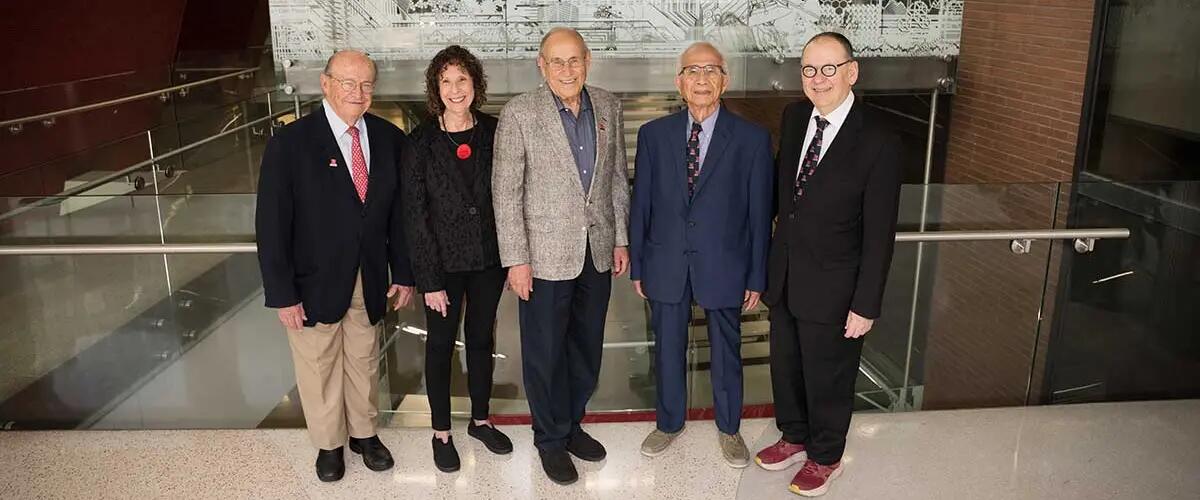
Professors Miklos Vasarhelyi, Rosa Oppenheim, Dan Palmon, Cheng-Few Lee and Glenn Shafer
Five professors, 250 years of teaching, research, and inspiration
The collective calculation is eye-popping: Add up the careers of five senior Rutgers Business School professors and the sum amounts to nearly 250 years of teaching.
Each of the professors has spent nearly a half century in college classrooms. During their careers, blackboards gave way to whiteboards, laptop computers replaced lined notebooks, and overhead projectors became as unnecessary as pencil sharpeners.
These professors have generated new ideas, some of it cutting-edge and revolutionary. They have influenced industries, guided the intellectual curiosity and research of Ph.D. students, and taught different aspects of business to enough students to run a few major companies.
What follows are snapshots of their careers.
When she isn’t teaching, there’s a good chance Rosa Oppenheim is a student in someone else’s class.
During her last semester as an undergraduate, an Introduction to Operations Research class prompted Oppenheim to turn down a handful of job offers and stay in school and pursue a Ph.D. so she could work in academia.
She earned her Ph.D. from Polytechnic Institute of Brooklyn, now part of New York University’s Tandon School of Engineering. She has completed two more master’s degrees in English and in Liberal Studies and still takes classes regularly in the humanities, social sciences and other subjects.
“I’m not out of the classroom very much,” she said with a laugh.
Oppenheim has taught Ph.D., MBA, Executive MBA and undergraduate students at Rutgers Business School. She also spent nearly 20 years in administration, as executive vice dean, twice as an associate dean, and twice as acting dean. In 2016, she was named a dean’s professor of business for her contributions to the school.
For a time, she worked as a corporate consultant and trainer in quality management. “It really enhanced my ability to teach and do research,” she said, “and enabled me to combine the underlying theory of what I was teaching with how it really works in practice.”
Her career reflects both a passion for teaching and an appreciation for public education. “I’m a first generation American, a first-generation college student,” she said. “What Rutgers is doing as a state university is so important and so critical. I’m very proud to be part of that."
Initially, Dan Palmon found an escape in education.
He was a young man and a bit cynical when he came to the United States after enduring years of war in Israel, his homeland. He had dreamed of being a professional soccer player, but his first job in America was driving a truck.
Once he earned his Ph.D., Palmon quickly realized the accounting industry, unlike Wall Street, had little regard for the degree. Palmon chose to work in academia as a result. At Rutgers Business School, Palmon became chair of the accounting department, a role he held for an impressive 30 years. “That’s a big achievement,” he said.
An even bigger achievement may be his prolific research published in the field’s top journals on such topics as auditor independence, corporate financial reporting and executive pay. In 1992, the breadth and prominence of his accounting research earned him the prestigious William J. von Minden Chair.
His favorite research collaborators are Ph.D. students. “It keeps me young,” he said. In reality, he is a sage who Ph.D. students often reach out to share their ideas and get answers to their questions.
“My contribution to the world,” he said, “is teaching my Ph.D. students how to conduct research.”
Cheng-Few Lee got an early start in the academic balancing act of teaching and generating the kind of provocative research that brings prominence to a university.
After earning a master’s degree in Taiwan and working in banking, Lee decided to continue his study of economics. He earned his Ph.D. in economics and finance from SUNY-Buffalo.
Three years into his first job as an assistant professor in the Department of Banking and Finance at the University of George in Athens, he had published 10 papers, eight of which landed in top journals.
Half of Lee’s 51-year-long career in academia has been spent at Rutgers. He was hired by the university in 1988 to start an undergraduate program in finance. Today, the Rutgers Business School finance major is one of the top-ranked among business schools in the Big Ten.
Lee also continued his scholarly work, starting a new journal, Review of Quantitative Finance and Accounting, and creating symposiums as a way of showcasing thought leadership. The Conference on Financial Economics, Accounting and Management, which he has organized for more than 30 years, is considered one of the Top 3 conferences in the field.
Lee said his quantitative background helped his early career. In 1976, the University of Illinois at Urbana-Champaign offered him a job as associate professor, he explained, with the understanding that he would refocus the qualitative nature of their program to a quantitative one.
It was always his ambition to be known for teaching as much as research. He has taught more than 100 Ph.D. students and continues to teach undergraduates, using his own textbook in corporate finance.
“I was always interested in passing knowledge on to a new generation,” he said.

Glenn Shafer is something of a celebrity scholar in the field of statistics.
His work on an alternative theory of probability has been applied widely in engineering and artificial intelligence. He is also well known for initiating the game-theoretic framework that represents a new way of thinking about probability, statistics, and finance theory.
Heady scholarship from a Kansas farm boy who once thought he would follow in the footsteps of his father and make a life as a dairy farmer.
Instead, Shafer studied mathematics and French at Princeton. He joined the Peace Corp after graduation – a choice motivated by both idealism and the prospect of being sent to war – and was assigned to Afghanistan where he taught teach geometry as part of a program to train surveyors.
The Vietnam War was still raging when Shafer returned home. After failing his draft physical, he looked for work, but eventually decided on another path: graduate school.
His doctoral work took him from Berkeley to Boston before he returned to Princeton to finish his dissertation and begin his teaching career. He taught mathematics at Kansas University before moving to its business school.
Shafer’s scholarly work is recognized around the world: He holds an honorary doctorate in economics from the University of Economics in Prague, and he has taught as a visiting professor in Paris and Berlin. He was both a Guggenheim Fellow and a Fulbright Fellow.
In 1992, Shafer began teaching at Rutgers. He led the Ph.D. program for 10 years and served as dean for four years before returning to teaching.
"My career in academics was a natural outgrowth of my love of learning,” he said. “By mere accident I was admitted to graduate study in statistics, and it was a perfect fit for my mischievous side, my interest in philosophy and mathematics and even my interest in France because much of the history of probability took place there.”
In academia, there are scholars and practitioners. When people describe Miklos Vasarhelyi, the word they use is pioneer.
Long before the business world became fixated on Artificial Intelligence – more than 30 years before – Vasarhelyi was writing about how the technology could be applied in accounting. “Look what’s happening in AI now,” he said matter-of-factly as if he has just been waiting for the business world to catch up.
Vasarhelyi is the force behind the Accounting Research Center and its Continuous Audit and Reporting Laboratory, and the work happening at the CAR Lab is a major reason why Rutgers continues to be ranked No. 1 in the world for accounting and information management.
After earning a master’s degree at MIT, Vasarhelyi went to the University of California-Los Angeles for his Ph.D. He spent four years working with long-time collaborator and friend, Ted J. Mock, in the university’s accounting department before he moved to New York City to work at Columbia.
From Columbia, he went to work at Bell Labs, where everyone was more focused on computers and innovation. Bell Labs is where Vasarheyli developed the original continuous audit application, a tech-driven process of ongoing, more efficient auditing. He also started teaching again at nights, working almost exclusively with Rutgers Ph.D. students.
In addition to creating a world renown research center, he has written an estimated 300 papers and 25 books. The innovation he brings to the accounting field earned him the KPMG endowed professorship, which he continues to hold.
He still relishes working with Ph.D. students and rattles off some exciting AI-related projects he is working on with them now. Why focus on past accomplishments? Vasarheyli is content to look forward and continue pondering possibilities.
“I’m much more interested,” he said, “in the next new idea.”
-Susan Todd
Press: For all media inquiries see our Media Kit


